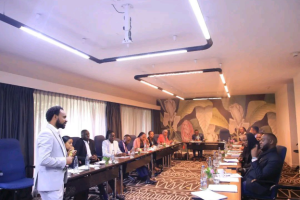BY ADDISALEM MULAT
As Ethiopia prepares to launch the much-anticipated second filling of the Grand Ethiopian Renaissance Dam, Egypt continues to politicize and internationalize the technical matters of the dam in far-fetched objectives. In fact, Egypt’s approaches were doomed to fail as they lack rationality. The country’s attempts are meant to garner favor from its paymasters and exerting maximum pressure on Ethiopia to succumb to its demands.
However, the politicization and internationalization of the GERD by Egypt have failed neither to bring benefit to Egypt itself nor to the ongoing tripartite negotiation among Ethiopia, Sudan and Egypt. First by taking the matter to the UNSC and second by involving the US, Egypt tried every available means to give the technical matter of the dam different fig-leafs.
As the saying goes ‘old habit dies hard’ Egypt failing to learn from its previous mistakes has continued to paint a wrong picture of the GERD. This act is accompanied by tsunamis of misinformation both on social media and mainstream platforms. But again as the adage goes ‘truth and down get crystal clear gradually’, the international community have come to know the hard facts about the dam and those who seemed to be confused will be reconciling with the truth soon.
The fact is neither politicizing nor internationalizing could avert the construction of the dam. Ethiopians do not start something they do not finish. Now that the construction of the dam reached 79 percent, Egypt has no option but to come to its sense and stick to an open and genuine talk.
Egypt and Sudan understand Ethiopia is constructing a hydroelectric dam that does not cause a significant harm to both nations; they time and again make every effort to delay the construction of the Grand Ethiopian Renaissance Dam (GERD). More often than not, instead of endeavoring to resolve the issue in an orderly fashion, they perplex the international community through disinformation and smear campaign.
In the same manner, the two countries’ spare no effort in a bid to distract the construction of the GERD. Aside from their chameleonic behavior and stance they leave no stone unturned to politicize and internationalize the issue by giving the cold shoulder to African solutions.
As an alternative both nations must keep thinking about making the most of their abundant underground water resources knowledgeably than complaining on Ethiopia. Egypt does not have to endeavor to politicize and internalize the Nile issue time and again.
Cairo’s tendencies of politicizing and internationalizing the dam are shuttering down any hope of possible agreement over the technical issues, which only hurts Egypt itself, according to experts.
Speaking with The Ethiopian Herald previously, experts warn on possible derail of entire technical consultations unless Egypt stops slippery positions and give the technical matter a political fig leaf.
Talks on technical issues have seen frequent halts due to Egypt’s temporized position; stalemates which experts think would cast a shadow on regional hydro cooperation. Since the launching of the Dam back in 2011, Ethiopia has opted for limiting the issue into technical contexts with which various technical committees have been formed with various jurisdictions, said Eastern Nile Technical Regional Office (ENTRO) Executive Director Fekahmed Negash in his previous interview with The Ethiopian Herald.
The issue of the Dam is a technical issue and all problems could be solved technically. “Egypt is trying to use the Dam as a cover to grab a long-standing issue of water allocation to their advantage. That is why they are seen now and again taking the issue of the dam to the political and security level.”
This is a very dangerous move that should be avoided at any level, he stressed, adding it is advisable to systematically bounce the process back to the technical level so that the required solution can be obtained, commented Fekahmed.
The engagement of the countries on matters relating to the Dam should be maintained and sustained at a technical level. When the technical level engagement runs into stalemate, the political level can come in reengage the technical level and withdraw systematically. If this is maintained, Egypt would cut hope that the opportunities they are seeking from the political level would not come up and opt for agreeing to the technical findings.
Ethiopia has come up with different alternatives with regard to the Dam filling which is purely technical. However, Egypt is bidding time by changing the level of consultation frequently, he commented. “If the thing remains unchanged from the Egyptian side, Ethiopia may have to resort to a unilateral decision and finalize the Dam, for doing so does not result in harm to the downstream countries.”
Further, he said: “Ethiopia should prepare its own technical and legal documents for negotiation and present it to the countries for negotiation. This would enable Ethiopia to seat on the driving seat during negotiation. It will also improve Ethiopia’s negation power.”
To him, the countries could resume the negotiation with or without a third party. But the negotiation should focus on the filling and operation of the GERD only. “It should focus on the water entering the Dam and the release of water from the Dam.”
As learned from the Ministry of Foreign Affairs website, Deputy Prime Minister and Foreign Minister of Ethiopia, Demeke Mekonnen said, neither politicization nor sabotage should guide policies over the Nile but promoting cooperation, understanding, and integration should be the guiding spirit.
The negotiations over the GERD provide this opportunity, he said if Egypt and Sudan follow a constructive approach to achieve a win-win outcome within the framework of the ongoing AU-led process.
Exerting unnecessary pressure on Ethiopia by intentionally politicizing and internationalizing the matter will not make Ethiopia accept the colonial-era treaty over the Nile River, he said.
The Deputy Prime Minister said Ethiopia would never agree with such unfair terms that seek to maintain the hydro hegemony of Egypt and Sudan.
The Deputy Prime Minister made the remarks on Thursday (April 15) while delivering an opening speech to an online discussion that was hosted by the Ethiopian Embassy in London and organized by the Ministry of Foreign Affairs of Ethiopia in collaboration with various Ethiopian Missions in Europe.
According to the moderator, Ambassador Teferi Meles, the webinar was aimed to provide an update on the ongoing negotiation over the GERD and clarify some issues related to the matter.
Attending the discussion, one of the Renaissance Dam Ethiopian Negotiating team members, Professor Yilma Seleshi said Sudan and Egypt are keen on having a water-sharing agreement than handling the specific cases related to the GERD.
In this regard, he said, Ethiopia is not willing to sign an agreement that will compromise the development endeavors of future generations.
Lemlem Fissaha, another member of the Renaissance Dam Negotiating team, said what Ethiopia has done in going so far in trying to entertain water-sharing talks, in the absence of international agreement on the use of Nile water is commendable.
The meeting was attended by more than 200 participants, where Ethiopian Ambassadors and diplomats in Europe, negotiators that represent Ethiopia over the tripartite talks, the media, Ethiopians, and friends of Ethiopia.
The Ethiopian Herald April 17/2021




